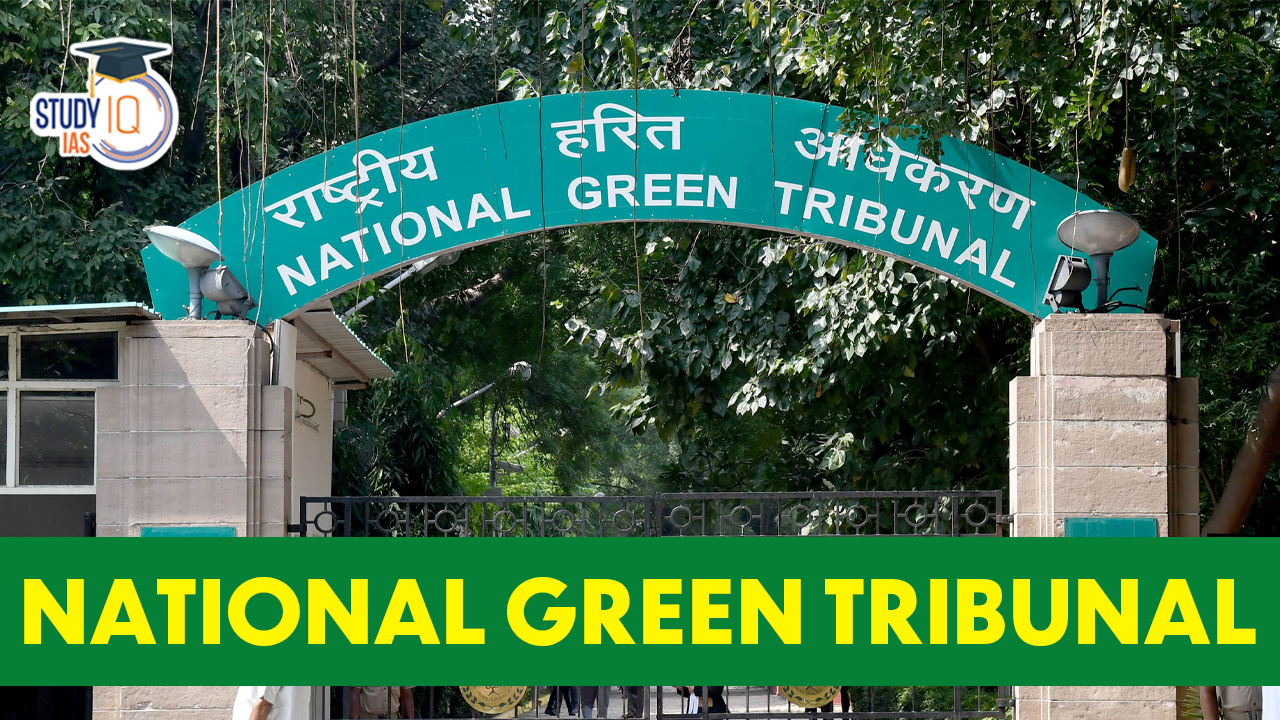Table of Contents
Context: The National Green Tribunal (NGT) received 15,132 new cases and disposed of 16,042 cases from July 2018 to July 2023.
About the National Green Tribunal (NGT)
| Establishment |
|
| Inspiration from Article 21 |
|
| Objectives |
|
| Composition of NGT |
|
| Structure |
|
| Powers and Jurisdiction |
|
Success of National Green Tribunal
- Since its inception, the NGT has, apart from creating a new breed of legal practitioners, protected vast acres of forest land, halted polluting construction activities in metros and smaller towns.
- It has taken strict action against negligent officials who have neglected their duty to enforce laws and held accountable major corporate entities.
- It has safeguarded the rights of indigenous communities and ensured the full implementation of the “polluter pays” principle.
- Important Orders Given by NGT:
- Ban on 10-year-old diesel vehicles: In 2015, the NGT banned all diesel vehicles over 10 years old in Delhi to address the issue of air pollution.
- Closure of industries around Bellandur Lake: In 2018, the NGT ordered the closure of industries around Bellandur Lake in Bangalore, citing pollution of the lake and violation of environmental laws.
- Closure of Sterlite copper plant: In 2018, the NGT upheld the Tamil Nadu Pollution Control Board’s order to close the Sterlite copper plant in Thoothukudi, citing pollution and violation of environmental norms.
- Compensation for victims of oil spills: In 2019, the NGT ordered a compensation of Rs. 25 crores to be paid to victims of an oil spill in Tamil Nadu, caused by a collision between two ships.
- Some Important Judgements by NGT:
- Goa mining case: In this case, the NGT ordered a ban on mining activities in Goa, citing violation of environmental laws and damage to the local ecology.
- Ganga pollution case: In this case, the NGT directed the Central Pollution Control Board and the state pollution control boards to take immediate steps to control pollution in the river Ganga.
- Vizhinjam International Seaport Limited case: In this case, the NGT directed the Vizhinjam International Seaport Limited in Kerala to obtain all necessary environmental clearances before proceeding with the construction of a new port.
Criticism of National Green Tribunal
- Delay in Justice: Despite being established to expedite the disposal of cases related to the environment, the NGT has faced criticism for delays in delivering judgments. The backlog of cases has been piling up, and it takes years for the tribunal to resolve them.
- Lack of Independence: Some critics argue that the NGT lacks independence from the government, which undermines its effectiveness as an independent judicial body. The tribunal is headed by a chairman, who is appointed by the central government, and there have been allegations of political interference in the appointment of NGT members.
- Limited Scope: The NGT’s jurisdiction is limited to certain environmental issues, and it cannot address broader issues related to development and sustainability. This limitation has been criticized for hindering the NGT’s effectiveness in protecting the environment.
- Inadequate Infrastructure: The NGT has faced criticism for inadequate infrastructure, including lack of proper courtrooms, staff, and resources. This has resulted in delays and poor functioning of the tribunal.
- Limited Reach: The NGT’s reach is limited to only a few major cities in India, which means that people in rural areas may not have access to the tribunal. This limits the NGT’s effectiveness in protecting the environment across the country.
Way Forward
- Expansion of Regional Benches: The NGT should considerably increase the number of regional benches, preferably located in areas with abundant forest cover or significant mineral deposits.
- System of Larger Bench in NGT: Provision for appeals against NGT orders should be made before a larger bench of the Tribunal, prior to approaching the Supreme Court or High Court.
- Addressing Administrative Inadequacy: Immediate action is required to fill the vacancies in the NGT, ensuring efficient functioning of the tribunal.
- Collaborative Approach: The central and state governments should foster a collaborative approach with the NGT, striking a balance between environmental concerns and economic considerations.


 Securities Markets Code Bill 2025: Towar...
Securities Markets Code Bill 2025: Towar...
 Weakly Interacting Massive Particles (WI...
Weakly Interacting Massive Particles (WI...
 India–Oman Trade Deal: CEPA Signed to ...
India–Oman Trade Deal: CEPA Signed to ...

























